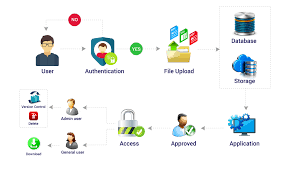
Archive Management System: Streamlining Data Storage and Retrieval
An archive management system is a crucial component of any organization’s IT infrastructure, enabling efficient storage, organization, and retrieval of data for long-term preservation. With the exponential growth of digital information, businesses are increasingly turning to archive management systems to manage their vast amounts of data effectively.
One of the key benefits of an archive management system is its ability to categorize and store data based on its importance, age, or relevance. By implementing automated archiving policies, organizations can ensure that valuable data is securely retained while less critical information is moved to cost-effective storage solutions.
Furthermore, an archive management system facilitates quick and easy retrieval of archived data when needed. Users can search for specific files or documents within the archive using metadata tags or keywords, saving time and improving productivity.
Security is another critical aspect of archive management systems. By implementing access controls, encryption mechanisms, and audit trails, organizations can protect their sensitive data from unauthorized access or tampering.
Moreover, compliance with regulatory requirements such as GDPR or HIPAA is simplified with an archive management system. Organizations can easily demonstrate adherence to data retention policies and ensure that sensitive information is handled in accordance with legal guidelines.
In conclusion, an archive management system plays a vital role in modern data storage practices by providing efficient organization, secure storage, quick retrieval, and regulatory compliance. By investing in a robust archive management system, organizations can streamline their data management processes and ensure the long-term preservation of valuable information.
Essential Insights into Archive Management Systems: Principles, Definitions, and Best Practices
- What are the principles of archival management?
- What is an archiving system?
- How do you manage archives?
- What is archive management system?
What are the principles of archival management?
The principles of archival management encompass a set of guidelines and best practices that govern the organization, preservation, and accessibility of archival materials. Key principles include provenance, which emphasizes maintaining the original context and source of records; original order, which preserves the arrangement of records as they were created or received; and collective control, ensuring that archives are managed systematically and comprehensively. Additionally, authenticity, integrity, and confidentiality are essential principles that uphold the trustworthiness and security of archival materials. By adhering to these principles, archive management systems can effectively safeguard historical records, facilitate research access, and uphold ethical standards in preserving our collective memory.
What is an archiving system?
An archiving system is a specialized software or platform designed to systematically store, manage, and retrieve data for long-term preservation and compliance purposes. It enables organizations to categorize and store data based on predefined criteria such as age, importance, or relevance, ensuring that valuable information is securely retained while less critical data is moved to cost-effective storage solutions. Archiving systems also facilitate quick and efficient retrieval of archived data through search functionalities, metadata tags, or keywords, allowing users to access specific files or documents when needed. Additionally, these systems often incorporate security features such as access controls, encryption mechanisms, and audit trails to protect sensitive information from unauthorized access or tampering. Overall, an archiving system plays a crucial role in modern data management practices by ensuring organized storage, easy retrieval, and compliance with regulatory requirements.
How do you manage archives?
Managing archives involves implementing a systematic approach to storing, organizing, and retrieving data for long-term preservation. To effectively manage archives, organizations typically establish clear policies and procedures for categorizing data based on its relevance and importance. Automated archiving tools can help streamline the process by automatically moving less frequently accessed data to secondary storage while keeping critical information easily accessible. Implementing robust security measures, such as access controls and encryption, is essential to safeguard sensitive data within the archives. Regularly reviewing and updating archive management practices ensures that the system remains efficient, compliant with regulations, and capable of meeting the organization’s evolving needs.
What is archive management system?
An archive management system is a specialized software solution designed to efficiently store, organize, and retrieve large volumes of data for long-term preservation. It serves as a centralized repository where organizations can categorize and manage their information based on relevance, importance, or age. By implementing automated archiving policies and robust search functionalities, an archive management system enables users to easily locate and access specific files or documents within the archive. This system also ensures data security through access controls, encryption measures, and audit trails, making it an essential tool for maintaining compliance with regulatory requirements and safeguarding sensitive information.
